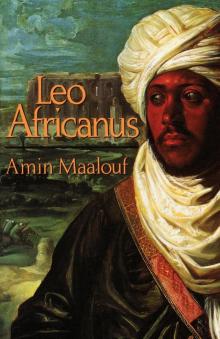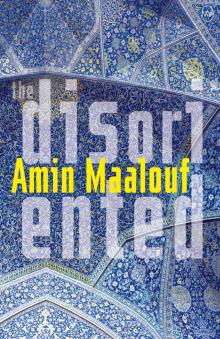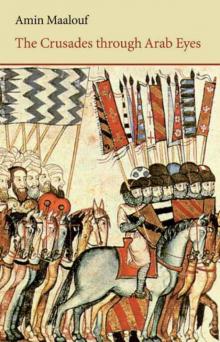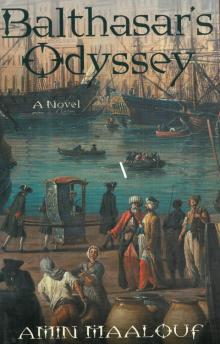- Home
- Amin Maalouf
The Crusades Through Arab Eyes Page 18
The Crusades Through Arab Eyes Read online
Page 18
Mu‘īn al-Dīn ‘Unar’s manoeuvre met with immediate success. Having reached a secret agreement with the local Franj, who now undertook to convince the king of the Germans to abandon Damascus before the arrival of the reinforcing armies, he sought to assure the success of his diplomatic intrigues by granting attractive bonuses. At the same time, he sent hundreds of snipers into the orchards ringing the city to ambush and harass the Franj. By Monday night the dissension aroused by the wily old Turk began to have its effect. The suddenly demoralized attackers had decided on a tactical retreat to regroup their forces, and they now found themselves harassed by the Damascenes on a completely exposed plain, with no water supply whatever. Within a few hours their position had become so untenable that their kings no longer contemplated seizing the Syrian metropolis, but thought only of saving their troops, and themselves, from annihilation. By Tuesday morning the Frankish armies were already falling back towards Jerusalem, pursued by Mu‘īn al-Dīn’s men.
There was no doubt about it, the Franj were not what they used to be. Negligence and disunity among military commanders, it seemed, were no longer the unhappy prerogative of the Arabs. The Damascenes found this amazing. Was it possible that this powerful Frankish expedition, which for months had caused the entire Middle East to tremble, was disintegrating after only four days of battle? It was thought that they were preparing some trick, Ibn al-Qalānisi says. But no. The new Frankish invasion really was finished. The German Franj, Ibn al-Athīr says, returned to their country, which lies over yonder, beyond Constantinople, and God rid the faithful of this calamity.
‘Unar’s surprising victory raised his prestige and tended to make people forget his past compromises with the invaders. But Mu‘īn al-Dīn was in the last days of his career. He died a year after the battle. One day when he had eaten lavishly, as was his habit, he was taken ill. It was learned that he had been struck with dysentery. That, Ibn al-Qalānisi notes, is a fearful disease from which few recover. With ‘Unar’s death, power passed to the nominal sovereign of the city, ‘Abaq, a descendant of Tughtigin, a young man of sixteen of scant intelligence who would never stand on his own two feet.
The real winner of the battle of Damascus was undoubtedly Nūr al-Dīn. In June 1149 he succeeded in crushing the army of Raymond, prince of Antioch, whom Shīrkūh, the uncle of Saladin, killed with his own hands. Shīrkūh cut off his head and brought it to his master, who in accordance with custom sent it on to the caliph of Baghdad, in a silver box. Having thus removed any Frankish threat to northern Syria, the son of Zangī was free to devote all his efforts to the realization of his father’s old dream: the conquest of Damascus. Back in 1140 the city had preferred to strike an alliance with the Franj rather than submit to the brutal yoke of Zangī. But things had changed. Mu‘īn al-Dīn was dead, and the behaviour of the Occidentals had shaken even their most fervent partisans. Above all, Nūr al-Dīn’s reputation was nothing like his father’s. His aim was to seduce the proud city of the Umayyads, not violate it.
When he and his troops reached the orchards ringing the city, Nūr al-Dīn proved more concerned to win the sympathy of the population than to prepare an assault. Nūr al-Dīn, Ibn al-Qalānisi reports, acted benevolently toward the peasants and did not impose his presence upon them. Throughout Damascus and in its dependencies, the people prayed to God on his behalf. When, shortly after his arrival, abundant rains fell, ending a long drought, the populace credited Nūr al-Dīn with ending their sufferings. ‘It was thanks to him’, they said, ‘and to his justice and exemplary conduct.’
Although the nature of his ambitions was clear enough, the master of Aleppo refused to comport himself as a conqueror.
I have not pitched camp here in order to make war against you or to lay siege, he wrote to the leaders of Damascus. Only the many complaints of the Muslims have induced me to act in this way, for the peasants have been despoiled of their goods and separated from their children by the Franj, and they have no one to defend them. Since God has bestowed upon me the power to grant succour to the Muslims and to wage war on the infidels, and since I command great quantities of resources and of men, it would be impermissible for me to neglect the Muslims and fail to take up their defence, especially since I well know that you are unable to protect your provinces and am aware of your degradation, which led you to seek the aid of the Franj and to deliver the goods of your poorest subjects to them, subjects whom you have criminally wronged. This pleases neither God nor any Muslim.
This letter revealed the full subtlety of the strategy of the new ruler of Aleppo, who now put himself forward as the defender of the Damascenes, in particular of the disinherited among them, visibly seeking to arouse them against their rulers. The sharp response of the latter only helped to bring the citizenry ever closer to the son of Zangī. ‘All that stands between us now is the sword’, they said. ‘The Franj will come to help us defend ourselves.’
Despite the sympathy he had gained among the population, Nūr al-Dīn preferred not to confront the reunited forces of Jerusalem and Damascus, and so agreed to withdraw to the north. But not without having made some gains: his name would now be mentioned in the Friday sermons just after those of the caliph and sultan, and coins were struck in his name, a common manifestation of allegiance by Muslim cities seeking to appease conquerors.
Nūr al-Dīn was encouraged by this partial success. A year later, he returned to the Damascus area with his troops, sending a new letter to ‘Abaq and the other leaders of the city. I desire no more than the well-being of the Muslims, jihād against the infidels, and the release of the prisoners they are holding. If you come over to my side with the army of Damascus, if we help each other to wage the jihād, my wish will be fulfilled. ‘Abaq’s only response was to call upon the Franj once again, now marching under the banner of their young King Baldwin III, son of Fulk. They soon arrived, and camped at the gates of Damascus for several weeks. Their knights were even granted permission to wander through the souks at will, which inevitably aroused tension with the people of the city, who had still not forgotten those who had fallen three years before.
Nūr al-Dīn prudently continued to avoid any confrontation with the coalition partners. He withdrew his troops from the environs of Damascus, waiting for the Franj to return to Jerusalem. For him, the battle was primarily political. Playing the bitterness of the citizens for all it was worth, he sent letter after letter to the Damascene notables and religious leaders denouncing ‘Abaq’s treason. He also made contact with many military officers exasperated by ‘Abaq’s open collaboration with the Franj. For the son of Zangī, it was important no longer merely to stimulate protests that would embarrass ‘Abaq, but to organize a network of accomplices within the coveted city who could induce Damascus to capitulate. The father of Saladin was entrusted with this delicate mission. By 1153, after some skilful organization, Ayyūb had indeed succeeded in winning the benevolent neutrality of the urban militia, whose commander was a younger brother of Ibn al-Qalānisi. Several personalities of the army adopted a similar attitude, so that ‘Abaq’s isolation grew day by day. In the end, he was left with no more than a small group of emirs who still urged him to hold out. Having decided to get rid of these last hard-liners, Nūr al-Dīn arranged for false information to be sent to the ruler of Damascus to the effect that a plot was being hatched within his own entourage. Without bothering to find out whether or not the information was well-founded, ‘Abaq quickly executed or imprisoned several of his collaborators. His isolation was now complete.
One last operation remained. Nūr al-Dīn suddenly began intercepting all convoys of food heading for Damascus. Within two days the price of a sack of grain had risen from half a dinar to twenty-five dinars, and the populace began to fear starvation. It remained only for the agents of the ruler of Aleppo to convince public opinion that there would have been no shortages had ‘Abaq not chosen to ally with the Franj against his coreligionists of Aleppo.
On 18 April 1154 Nūr al-Dīn returned to the gat
es of Damascus with his troops. Once again ‘Abaq sent an urgent message to Baldwin. But this time the king of Jerusalem did not have time to react.
On 25 April the final assault was launched on the eastern side of the city.
There was no one defending the walls, the chronicler of Damascus reports, neither soldier nor citizen, except for a handful of Turks in charge of guarding a tower. One of Nūr al-Dīn’s soldiers rushed toward a rampart, at the summit of which stood a Jewish woman, who threw him a rope. With it he scaled the wall, reaching the top of the rampart without anyone’s noticing. He was followed by many of his comrades, who unfurled a banner, planted it atop the wall, and began to shout: ya manṣūr, ‘O, victorious one!’ The Damascene troops and the population abandoned any resistance, because of their sympathy for Nūr al-Dīn, for his justice and good reputation. A sapper ran to Bāb al-Sharq, the east gate of the city, and shattered the closing apparatus with his pick. Soldiers rushed through it and fanned out through the main arteries of the city without encountering any opposition. Bāb Tūma, Thomas Gate, was also thrown open to the troops. Finally, King Nūr al-Dīn made his entrance, accompanied by his entourage, to the great joy of the inhabitants and soldiers, all of whom were obsessed by their fear of famine and their terror at being besieged by the Franj infidels.
Generous in victory, Nūr al-Dīn granted ‘Abaq and his close collaborators fiefdoms in the region of Homs and allowed them to flee with all their property.
Nūr al-Dīn had conquered Damascus by persuasion more than by force, with little fighting and no bloodbath. The city which for a quarter of a century had fiercely resisted all those who sought to subjugate it, be they Assassins, Franj, or supporters of Zangī, had allowed itself to be seduced by the sweet insistence of a prince who promised to guarantee its security and to respect its independence. Damascus was not to regret its decision, and thanks to Nūr al-Dīn and his successors, the city enjoyed one of the most glorious periods of its history.
The day after his victory, Nūr al-Dīn assembled the ‘ulamā', qāḍīs, and merchants and delivered a reassuring speech; he also brought along large stocks of food and abolished a number of taxes affecting the fruit trade, the vegetable souk, and the distribution of water. An appropriate decree was drafted and announced from the pulpit the following Friday, after the prayer. The eighty-year-old Ibn al-Qalānisi was still on the scene to share in the joy of his fellow citizens. The population applauded, he reports. The citizens, the peasants, the women, the poor—everyone addressed public prayers to God that Nūr al-Dīn be granted long life and that his banners be ever victorious.
For the first time since the beginning of the Frankish wars, the two great Syrian metropolises, Aleppo and Damascus, were united in a single state, under the authority of a 37-year-old prince who was determined to prosecute the struggle against the occupier. In fact, all of Muslim Syria was now unified, except for the small emirate of Shayzar, where the Munqidhite dynasty still managed to preserve its autonomy. But not for long, for the history of this tiny state was to be shaken in the sharpest and most unexpected manner imaginable.
In August 1157, as rumours were circulating in Damascus that Nūr al-Dīn was preparing an early campaign against Jerusalem, an earthquake of unusual violence devastated all of Syria, sowing death among Arab and Franj alike. Several towers of the Aleppo city walls collapsed, and the terrified population dispersed into the surrounding countryside. In Ḥarrān the earth split so deeply that the remains of an ancient city were visible through the immense breach. In Tripoli, Beirut, Tyre, Homs, and Ma‘arra, there were countless dead; innumerable buildings were destroyed.
But two cities were hit harder than any others by the cataclysm: Hama and Shayzar. It is said that a teacher in Hama, who had left his classroom to satisfy a pressing call of nature in a nearby vacant field, found his school demolished and all his pupils dead upon his return. Dumbfounded, he sat bleakly upon the ruins wondering how he would break the news to the parents, but none of them survived to claim their children.
On that same day in Shayzar, the sovereign of the city, the emir Muḥammad Ibn Sultān, a cousin of Usāmah, was organizing a reception in the citadel to celebrate his son’s circumcision. All the city’s dignitaries were there, along with the members of the ruling family, when the earth suddenly began to tremble. The walls collapsed, decimating the entire assembly. The emirate of the Munqidhites simply ceased to exist. Usāmah, who was then in Damascus, was one of the few members of his family to survive. Deeply moved, he wrote: Death did not advance step by step to destroy the people of my race, to annihilate them separately or to strike them down two by two. They all died in the twinkling of an eye, and their palaces became their tombs. Then he added bitterly: The earthquakes struck this indifferent country only to rouse it from its torpor.
The tragedy of the Munqidhites did indeed inspire their contemporaries to much reflexion about the futility of all things human. More prosaically, the cataclysm offered people the opportunity to conquer or pillage with impunity in desolated cities or fortresses whose walls had crumbled. Shayzar in particular was immediately attacked, by both the Assassins and the Franj, before finally being taken by the army of Aleppo.
In October 1157 Nūr al-Dīn was taken ill as he was travelling from city to city supervising the repair of the walls. The prognosis of the Damascene physician Ibn al-Waqqar, who always travelled with him, was pessimistic. The prince hung between life and death for a year and a half, during which time the Franj occupied several fortresses and carried out a number of raids in the environs of Damascus. But Nūr al-Dīn took advantage of this period of enforced inactivity to ponder his destiny. During the first part of his reign, he had unified Muslim Syria under his aegis and had put an end to the internecine struggles that had weakened it. Now he would have to wage the jihād to reconquer the great cities occupied by the Franj. Some of his closest collaborators, especially the Aleppans, suggested that he start with Antioch, but to their great surprise, Nūr al-Dīn opposed this. Historically, he explained, that city belonged to the Rūm. Any attempt to seize it would tempt the Byzantines to interfere directly in Syrian affairs, and that would force the Muslim armies to fight on two fronts. No, he insisted, the Rūm must not be provoked. Instead they would try to recover an important coastal city, or even, God willing, Jerusalem.
Unfortunately for Nūr al-Dīn, events were soon to prove his fears justified. In 1159, as he was barely beginning to recover his health, he learned that a powerful Byzantine army, commanded by the emperor Manuel, son and successor of John Comnenus, had been assembled in northern Syria. Nūr al-Dīn quickly dispatched ambassadors to the emperor to extend him a courteous welcome. When he received them, the basileus, a wise man of majestic bearing and with a genuine interest in medicine, proclaimed his intention to maintain the most cordial possible relations with their master. If he had come to Syria, he assured them, it was only to teach the rulers of Antioch a lesson. It will be remembered that twenty-two years before, Manuel’s father had also come to Syria, supposedly for the same purpose; but that had not prevented him from making an alliance with the Occidentals against the Muslims. Nevertheless, Nūr al-Dīn’s ambassadors did not doubt the word of the basileus. They knew the rage felt by the Rūm at the mere mention of the name of Reynald of Châtillon, the knight who had presided over Antioch since 1153—a brutal, arrogant, cynical, and contemptible man who would come to symbolize for the Arabs everything evil about the Franj and whom Saladin would swear to kill with his own hands.
Prince Reynald, whom the chroniclers called ‘Brins Arnat’, arrived in the Middle East in 1147, dominated by the already anachronistic mentality of the first invaders: he thirsted for gold, blood, and conquest. Shortly after the death of Raymond of Antioch, he managed to seduce and then marry Raymond’s widow, thus becoming the lord of the city. His exactions had soon made him odious not only to his Aleppan neighbours, but also to the Rūm and to his own subjects. In 1156, on the pretext that Manuel had refused to pay him a
promised sum, he decided to take revenge by organizing a punitive raid on the Byzantine island of Cyprus, and he asked the patriarch of Antioch to finance the expedition. When the prelate expressed reluctance, he was thrown into prison and tortured; his wounds were then coated with honey and he was chained and left exposed to the sun for an entire day, his body ravaged by thousands of insects.
The patriarch, not surprisingly, finally opened his treasury, and the prince, after assembling a flotilla, disembarked on the coast of the Mediterranean island, crushed the small Byzantine garrison with no trouble, and unleashed his men on the island. Cyprus never fully recovered from what was done to it in that spring of 1156. All the island’s cultivated fields were systematically ravaged, from north to south; all the livestock was slaughtered; the palace, churches, and convents were pillaged, and everything that was not carried off was demolished or burned. Women were raped, old men and children slaughtered; rich men were taken as hostages, poor ones beheaded. Before setting off loaded with booty, Reynald ordered all the Greek priests and monks assembled; he then had their noses cut off before sending them, thus mutilated, to Constantinople.

 Samarkand
Samarkand Leo Africanus
Leo Africanus The Disoriented
The Disoriented The Crusades Through Arab Eyes
The Crusades Through Arab Eyes Balthasar's Odyssey
Balthasar's Odyssey